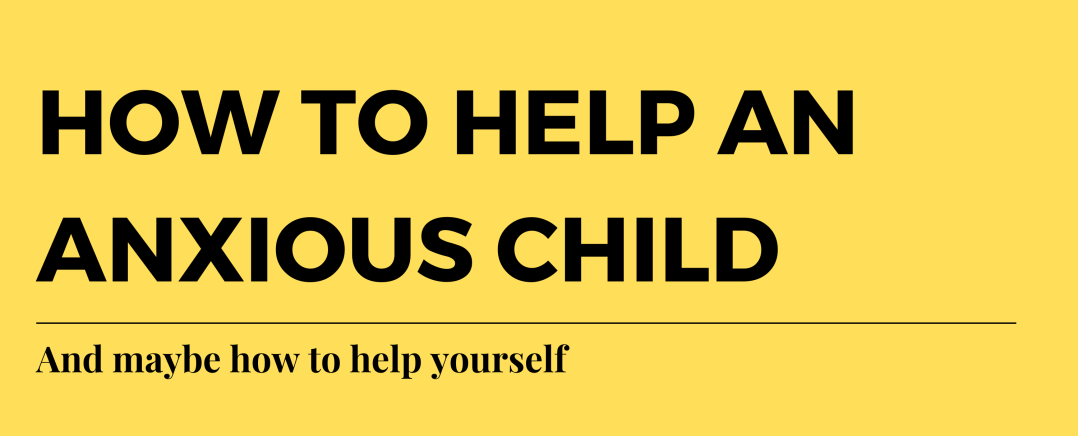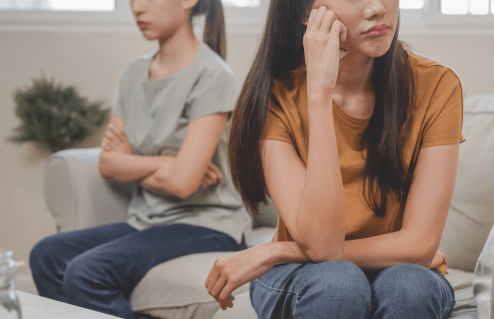How to help an anxious child (and maybe how to help yourself)

When someone we love is anxious, often the first thing we do is to try and make it better. Sometimes that means we try to jolly them along and make them see that there is nothing to worry about, or we throw them a solution.
- “Don’t be silly.”
- “It’s OK, you don’t need to be worried.”
- “Why don’t you just…”
There is nothing wrong with this instinct, it comes from a good place: we just want them to feel better, so of course we are going to try to offer something to make it all go away. This is even more the case when it’s a child. However, have you ever had someone say those things to you?
When you tell your partner or a friend about something you have been stressed or worried about and they point out all the reasons why you don’t need to be worried, or give you what they think is a simple solution, does it make your anxiety go away? Does it make you feel good?
Sometimes when this happens, we come away feeling frustrated, or perhaps worse: that we are being “silly” or “stupid” for feeling anxious in the first place. The same can happen for a child.
As adults, when we judge our moments of anxiety as “irrational” or “silly” then it tends to make the whole thing worse. Now we are not only anxious but also frustrated and critical of ourselves, which tends to add to the tension in our bodies. If we feel that we are being silly and that we need to just get a grip, then we might hold back from asking for help or support. We might reach for things that make it go away for a while: scrolling, keeping busy, overworking, cleaning, anything that just takes our mind off things
When we feel that our anxiety is irrational or daft, then we might feel ashamed or embarrassed about it. We might hide it or run away from it, we might feel trapped, isolated or alone.
What if we were taught instead that feeling anxious is completely reasonable and normal, no matter what it is about? What if we were shown that everybody gets anxious about different things and that even the bravest, strongest people in the world get anxious too? What if we were taught that we are never alone, that it is always OK to talk about it and seek support if we want to, and that anxiety will often pass like a wave if we are kind to ourselves and if we let it? That it can’t hurt you. That it is always OK to reach out a hand if you want some help.
Wanting to make the anxiety go away is the most natural thing in the world. We don’t want our children to suffer, of course we don’t. However, sometimes that leads us to jump a little too quickly to either dismiss the anxiety or push for a solution. Sometimes that also leads to some resistance or conflict, the child we are trying to help getting annoyed with us or pushing us away.
Actually, if we want to show our children that it really is OK to feel anxious and that they are not alone, it can be helpful to start with putting our need to “fix it” to one side, and to just focus upon normalising, first and foremost.
Acknowledge and empathise. Tell them you can see that they are anxious and that it makes sense. Try to really understand it and to put yourself in their shoes. Show them that they are not alone: hear them out, sit with them, look them in the eye. Give them a hug if they want one, or just be with them. If you want, you can tell them that you feel anxious about these things sometimes, too. That can be a hugely powerful message that the way they feel is normal and that they are not alone.
This might not solve the anxiety straight away, but that’s not the point. Sometimes you just can’t solve it straight away, no matter what you say. The point here is a long-term one: to try to help them have a different relationship with their anxiety. To know it is OK, to know they don’t have to be embarrassed or ashamed of it.
It also doesn’t mean that you aren’t also then allowed to offer some thoughts or suggestions if you think it might be useful and you think that they are up for hearing it. Of course you are. However, think about how different these two options are:
“Oh don’t be silly, there’s nothing to be scared of, you just need to…”
Versus
“I get that you feel anxious about it and it makes sense to me, I would probably be feeling anxious about it too… I’ve got some things that have helped me before, you mind if I tell you a bit about those?”
It’s not that we aren’t allowed to help or to give advice. It’s that sometimes we jump to it too quickly and give a message that we don’t intend.
Validation first and foremost is the way to go.
Thanks for reading. Until next time,
Ted
P.S. This is not only something to practice for the children in your life, it’s also something to practice doing for yourself: try out offering yourself some kindness and understanding about your anxiety rather than trying to force it away and “be strong.” It makes a difference.
Ted Bradshaw
Cognitive Behavioural Therapist and Coach
My name is Ted Bradshaw (@cbtted on Instagram and TikTok) and my main aim is to make mental health and anxiety in particular much easier to understand. I am a Cognitive Behavioural Therapist accredited by the BABCP and have been working in this area for over 15 years. I am an honorary Assistant Professor of Psychological Therapies at the University of Nottingham and I also work as a coach, accredited by the International Coaching Federation to PCC level. On my first day of training as a therapist, I was immediately annoyed. The things I was learning seemed so useful, and I was confused as to why I had never been taught any of this before, because it would have been so useful. For me, it seemed ridiculous that we would wait until people feel really bad before we offer them any information or insight into how anxiety or how a mind works. That is what led me to look into coaching and it is also why I spend a good deal of my time writing about and making short videos on lots of different aspects of mental health and anxiety in particular. As a parent, I have also found that what I know about anxiety has been so useful to me when dealing with my own children, so a lot of my focus is upon parents understanding anxiety for their children, too. These days in my 1:1 work with enduring mental health issues such as depression. OCD or PTSD, and I also work with people who might not be sure whether it is therapy they need but who are looking to improve something, like confidence or self-esteem. Finally, I also run workshops for schools and businesses on all of these subjects, including how to help an anxious child, good mental health in the workplace and more. You can find me across most social media platforms @cbtted, on Instagram and TikTok in particular.



